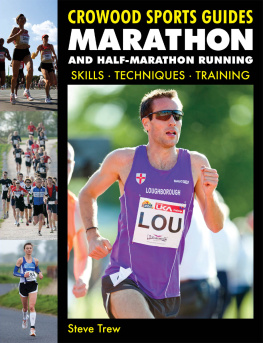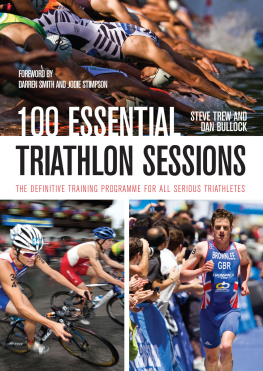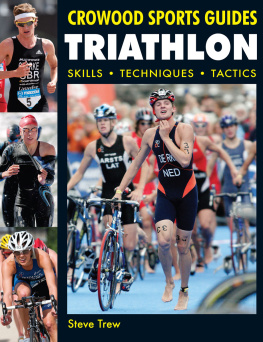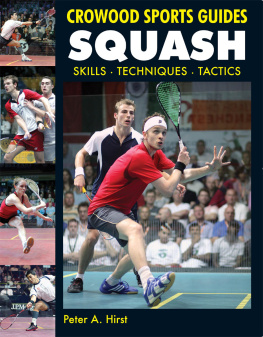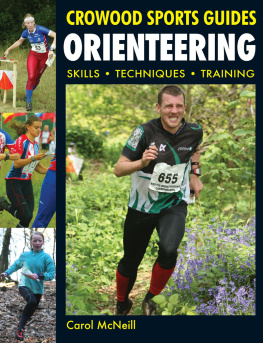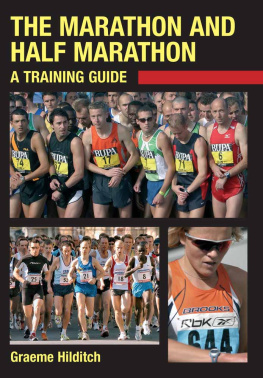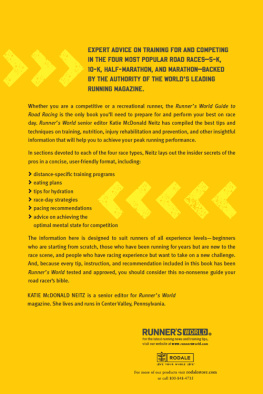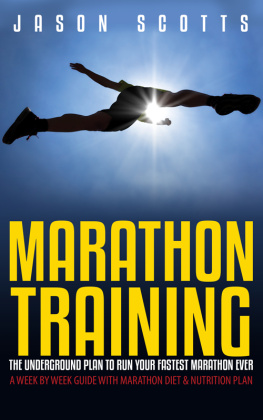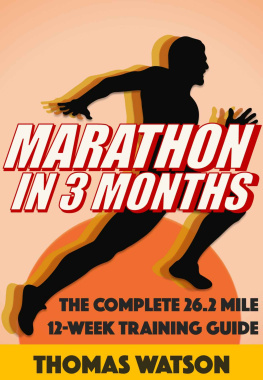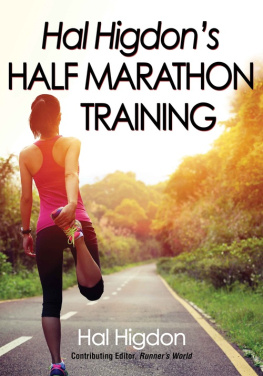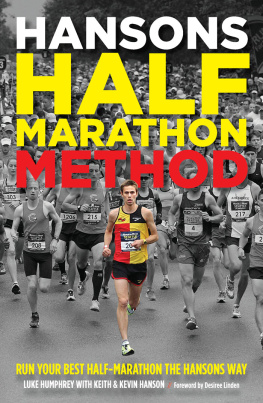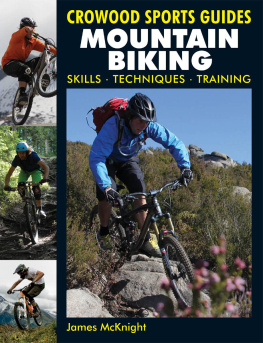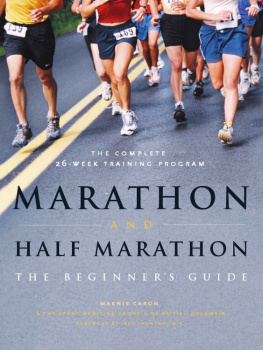CROWOOD SPORTS GUIDES
MARATHON
AND HALF-MARATHON RUNNING
SKILLS TECHNIQUES TRAINING
Steve Trew

THE CROWOOD PRESS
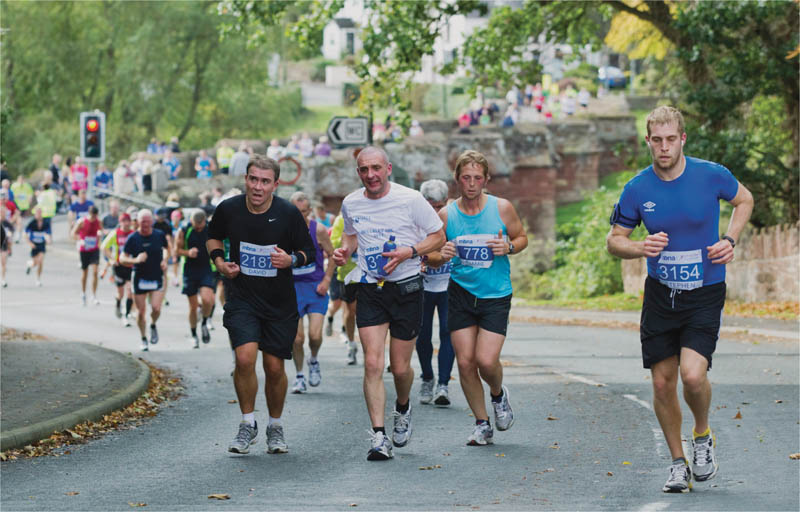
Competitors run up the hill into Farndon during the MBNA Chester Marathon.
First published in 2012 by
The Crowood Press Ltd
Ramsbury, Marlborough
Wiltshire SN8 2HR
www.crowood.com
This e-book first published in 2014
The Crowood Press Ltd 2012
All rights reserved. No part of this publication may be reproduced or transmitted in any form or by any means, electronic or mechanical, including photocopy, recording, or any information storage and retrieval system, without permission in writing from the publishers.
British Library Cataloguing-in-Publication Data
A catalogue record for this book is available from the British Library.
ISBN: 978 1 84797 856 1
Dedication
As ever, for Shane and Marilyn
Acknowledgements
My grateful thanks to Kath Atkin and Phil Pearson for their massive input to diet and nutrition, injury prevention, flexibility and strength training.
Photographs Nigel Farrow
CONTENTS
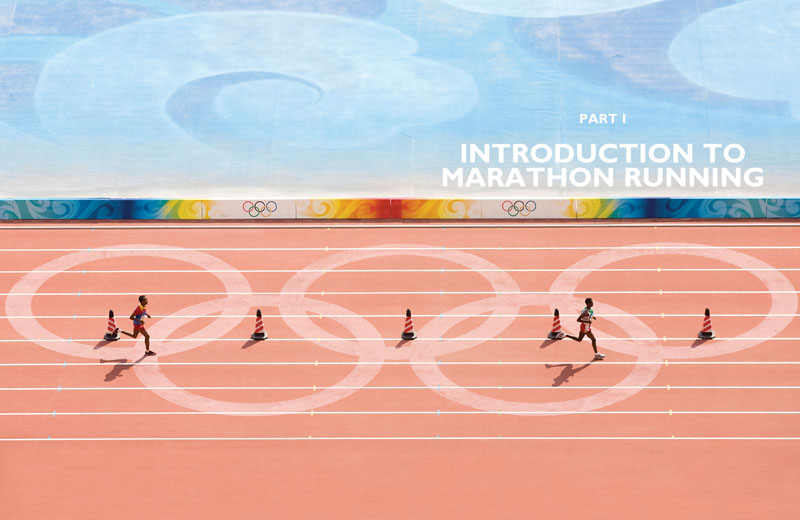
CHAPTER 1
HISTORY AND MYTHS
Ancient History or Myth?
The first Persian invasion of Greece took place in 490 BC . Vastly outnumbered, a force of 10,000 citizen-soldiers, mainly Athenians, engaged the invaders on the plain of Marathon to the north of Athens and won a decisive battle. The casualties were recorded as 192 Athenians, 11 Plataea soldiers and 6,400 Persians. The Athenians rightly regarded this victory as a decisive moment in their history and it marks the rise of Athenian democracy.
Before setting out from Athens for Marathon, the generals sent a herald off to Sparta to request their help. The heralds name was Pheidippides, a trained runner. According to the Greek historian Herodotus, he reached Sparta on the very next day after quitting the city of Athens the direct distance is estimated at 135140 miles. Having delivered the generals request, he then returned to Athens with the Spartans' reply that, due to religious observances, they could not leave Sparta until the full moon. When they received this news, the Athenian generals decided to attack the Persians anyway.
A further feat of endurance took place after the battle when the Athenians were alerted to a Persian fleet sailing for Athens. Having fought in battle, and still wearing their armour, they set off back to defend Athens and arrived before the Persians a distance of 26 miles.
The Start of the Modern Olympic Games
Almost twenty-four centuries later, in 1896, the first modern Olympic Games were held in Athens, Greece. The French historian Michele Breal proposed reenacting the legendary marathon in an event that would test the athletes powers of endurance; he also offered to put up a silver trophy for the winner. Baron Pierre de Coubertin, the inspirer of the modern Olympic Games, and Dimitris Vikelas, the Greek scholar who was also the first president of the International Olympic Committee (IOC) from 1894 to 1896, took the idea on board with great enthusiasm. The legend of the Marathon victory was therefore honoured by a 40km (25 mile) run from the Marathon bridge to the Marble Olympic Stadium of Athens.
Athens, Greece
The host nation of the first Olympics became ecstatic as Spyridon Louis, a Greek water-carrier, won the final, climactic race on 10 April in 2h, 58min, 50sec. The Marathon was born. Spyridon Louis, as the first Olympic Marathon gold medallist, became a legend, and the course from Marathon to Athens, used today for the annual Athens Classic Marathon, became known as the authentic or the original marathon course.
The next two Olympic Marathons were run over similar distances, being hosted in Paris in 1900 and St Louis in 1904. A Parisian, Michel Thato, won the marathon in Paris after much controversy, whilst Thomas Hicks, a Briton running for the USA, won the St Louis Olympic Marathon under even more bizarre circumstances.
Paris, France
There were persistent rumours that the Paris marathon winner, Michel Thato, took a short-cut through the Paris backstreets. The Olympic historians Andr Drevin and Raymond Pointu exonerated Thato, but nobody was really sure what actually happened such a long time ago. Another point of interest in the Michel Thato saga is that he was a Luxembourg national, a fact that was not registered at the time. It emphasizes how disorganized the Olympic organization was in those days.
St Louis, USA
Even stranger things were to happen at the marathon at the St Louis 1904 Olympic Games, which was held in 90F with only one drinks station, a water well at the 12-mile (19km) mark. It was hardly surprising that only 14 of 32 starters finished the marathon. The 40km (25-mile) course started with five laps around the stadium track. The runners then left the stadium and started on a dusty, unpaved course that took them up-and-down over seven different hills. The path was marked by red flags that showed the route, while horsemen cleared the trail along the way. They were followed by doctors, judges and reporters in cars (only just invented!). Only after this procession were the marathon runners to be seen! The net result was a constant cloud of dust kicked up into the runners faces. The first man to cross the finish line was Fred Lorz from New York City. Lorz completed the race in just over 3h. However, Lorzs victory did not last very long. Just as Lorz was about to accept his medal, it was discovered that he had accepted a lift in a car! It seems that Lorz had been suffering from stomach cramps, so he accepted the lift at the 9-mile (14.5km) point. He then rode in the vehicle for another 11 miles (18km), at which point the car overheated and broke down. Lorz, now totally rested and recovered, rejoined the race. He later claimed that he never meant to cheat and was going to tell everyone what he had done. Lorz was immediately banned for life from any future amateur competition. (This ban was lifted a year later and Lorz went on to win the Boston Marathon in 2h, 38min, 25sec).
It was a British-born man named Thomas Hicks, representing the USA, who actually won the marathon in a time of 3h, 28min, 53sec. When he ran into the stadium, the crowd barely noticed him! They had already welcomed home the original (cheating) winner.

